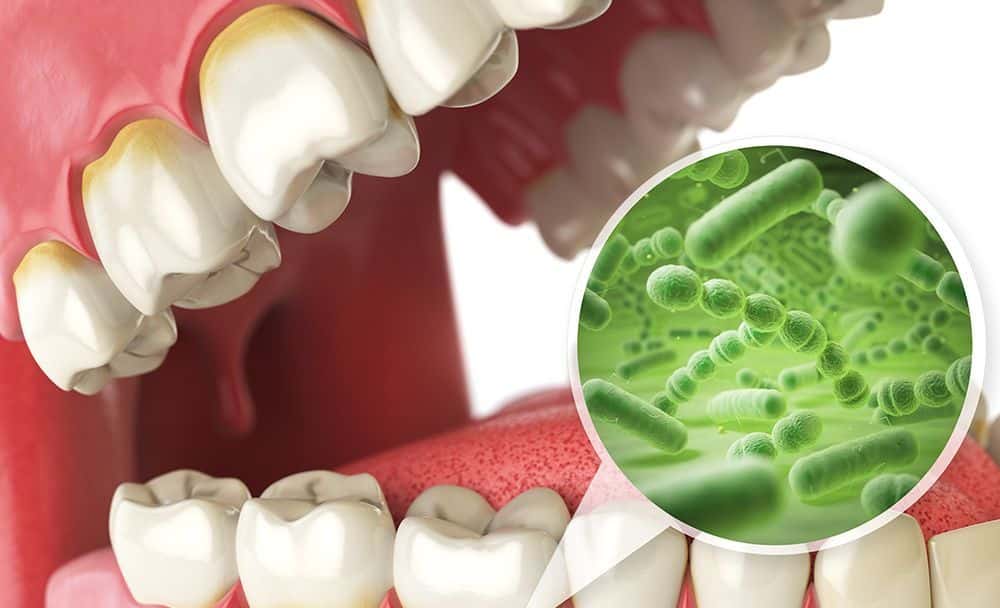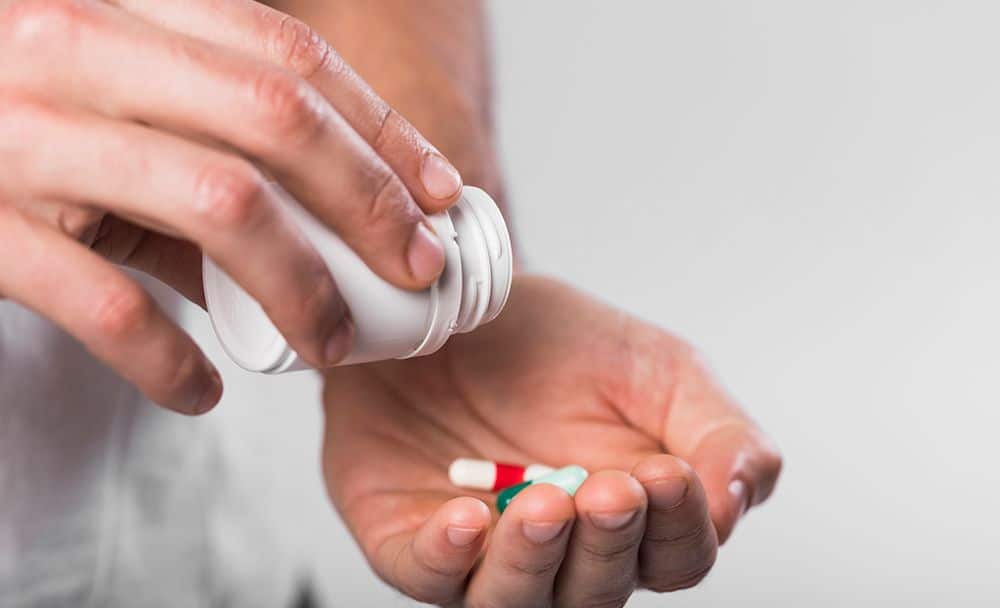
A mouth infection refers to an infection that occurs within the oral cavity, involving the tooth and its supporting structures such as the lips, gums, tongue, throat, or other structures in the mouth. These infections may be triggered by various factors, including poor dental hygiene, bacteria, viruses, fungi, or a combination of these microorganisms. While dental infections accounted for one of the major causes of mortality in the 1600s, it is seldom related and seen as a life-threatening cause today. [1] This article will explore the symptoms, causes, types, mouth infection treatment, and more related to mouth infections.
Symptoms of Mouth Infections:
Some common signs and mouth infection symptoms include:
Pain and discomfort:

A mouth infection often causes localized pain, discomfort, or soreness in the affected area. This may be accompanied by swelling and redness. [1]
Swollen and bleeding gums:
Gingival inflammation, characterized by swollen and bleeding gums, is one of the most common mouth infection symptoms such as gingivitis or periodontitis. [1]
White patches or plaques:
Oral thrush, a type of fungal infection caused by Candida, can result in the formation of white patches or plaques on your tongue, inner part of your cheeks or on the roof of your mouth. [6]
Mouth sores:
Open sores or ulcers may develop in the mouth, causing pain and discomfort. These sores can be a sign of conditions like herpes labialis. [7]
Bad breath:
Persistent bad breath (halitosis) can be a symptom of an underlying mouth infection, especially gingivitis and periodontitis. [8]
Difficulty swallowing or chewing:
Infections in the throat or oral cavity can make swallowing or chewing food painful or challenging. [9]
Causes of Mouth Infections:
A mouth infection can be caused by various factors, including:
Bacteria:
The most common cause of bacterial infection in mouth is Streptococcus mutans, which contributes to dental caries (tooth decay) and gum infections. [1]
Dental caries:
Dental caries, also called tooth decay, is a major contributing factor to the development of mouth infections. [1]
Injury to the mouth
Mouth infections can sometimes occur as a result of an injury to the oral tissues and cause infection. [1]
Poor oral hygiene:
Inadequate oral hygiene practices, such as infrequent brushing, flossing, or not using mouthwash, can contribute to the development of mouth infections.[1]
Viruses:
Viral infections like herpes simplex virus (HSV) can cause oral herpes or oral lesions. Human papillomavirus (HPV) can lead to oral warts or potentially oral cancer. [2]
Fungi:
Fungal infection in mouth , like oral thrush, is caused by proliferation and overgrowth of the Candida fungus, a type of yeast commonly found in the mouth. [3]
Weakened immune system:
A compromised immune system, due to conditions like HIV/AIDS, certain medications, or systemic illnesses, can increase the risk of developing a mouth infection. [7]
Other causes:
There are a variety of other causes that can lead to a mouth infection such as smoking, diabetes, medication, age, heredity, and stress. [4]
Types of Mouth Infections:
There are several types of mouth infection, including:
Treatment of Mouth Infections:
Mouth infection treatment depends on the type and severity of the infection. Common treatment approaches include:
Antibiotics:
Bacterial infections in the mouth may require the use of antibiotics to eliminate the causative bacteria. The specific antibiotic prescribed by your doctor will depend on the type and severity of the infection but usually includes medications like Penicillin and Amoxicillin. [1]
Dental procedures:
In cases of dental abscesses or advanced gum disease, dental procedures like root canal treatment, tooth extraction, or scaling and root planing may be necessary to remove the source of infection and promote healing. [1]
Improving oral hygiene:
Maintaining good oral hygiene practices, such as regular brushing, flossing, and using antibacterial mouthwash, can help prevent and manage mouth infections. [1]
Lifestyle changes:
Lifestyle modifications, such as quitting smoking and following a balanced diet can support overall oral health and reduce the risk of infections. [4]
Antifungal medications:

For fungal infection in mouth like oral thrush, antifungal medications such as antimycotics may be prescribed to control the growth of Candida. [6]
Antiviral mouth infection medicine:
Viral infections such as oral herpes may be managed with antiviral medications to alleviate symptoms and reduce the frequency of outbreaks. [6]
FAQs
How can mouth infections be diagnosed?
Diagnosing a mouth infection usually involves a thorough examination by a dental or medical professional. The healthcare provider will review the patient’s medical history, study the symptoms, and then conduct a physical examination of the oral cavity. In some cases, additional diagnostic assessments, such as swabs, biopsies, or imaging studies, may be required to determine the specific cause and severity of the infection.
How can mouth infections be prevented?
Preventing infection inside mouth involves adopting healthy oral hygiene practices and making lifestyle choices that promote oral health. Some preventive measures include:
Brushing: Brush your teeth at least two times a day using medicated or fluoride toothpaste and a soft-bristled toothbrush.
Flossing: Clean between your teeth daily with dental floss or an interdental cleaner to eliminate plaque and food particles.
Mouthwash: Use an antibacterial mouthwash to reduce the number of bacteria in your mouth.
Regular dental check-ups: Schedule regular dental check-ups and professional cleanings to detect and address any oral health issues early on.
Healthy diet: Maintain a balanced and healthy diet that is low in sugar and high in fruits, vegetables, and whole grains to support oral health.
Avoid tobacco and alcohol: Quit smoking and limit alcohol consumption, as they can increase the risk of oral infections and other oral health problems.
Practice safe oral habits: Avoid habits like nail-biting, using teeth as tools, or chewing on hard objects that can cause injury to the oral tissues and increase the risk of infection.
What are the most effective treatments in Ayurveda for mouth infections?
Some of the commonly used home remedies for mouth infection include:
Triphala: Triphala is a highly popular Ayurvedic herbal formulation consisting of three fruits: Amalaki (Indian gooseberry), Bibhitaki, and Haritaki. It is known for its antimicrobial properties and can be used as a mouthwash or for gargling to reduce inflammation and fight infection. This Ayurvedic remedy is highly effective in preventing dental caries and cavities. [10]
Neem (Azadirachta indica): Neem has strong antibacterial and antifungal properties that make it one of the most important home remedies for mouth infection. Using neem-based mouthwashes or rinsing with neem-infused water can help control the growth of microorganisms in the mouth and combat infections.
Turmeric (Curcuma longa): Turmeric contains curcumin, which possesses anti-inflammatory and antimicrobial properties. Applying a paste made out of turmeric powder and water directly to the affected area or using turmeric-infused mouthwashes can help reduce inflammation and promote healing.
Clove (Syzygium aromaticum): Clove has analgesic and antimicrobial properties. Applying clove oil or using clove-infused mouthwashes can help alleviate pain, reduce inflammation, and thus, can be used as a mouth infection medicine.
Ayurvedic herbal mouthwashes: Ayurvedic mouthwashes containing herbs like licorice (Glycyrrhiza glabra), babool (Acacia arabica), and cardamom (Elettaria cardamomum) are often used to reduce inflammation, freshen breath, and maintain oral hygiene.
Oil pulling: Oil pulling, known as Gandusha or Kavala in Ayurveda, involves swishing a tablespoon of oil (usually sesame oil or coconut oil) in the mouth for several minutes. This practice helps eliminate bacteria and toxins, promote oral health, and reduce the risk of infections.
Can tongue cleaners help in the prevention of mouth infection
Yes, tongue cleaners can help, as the tongue cleaner can scrape off the bacterial plaque sticking to your tongue. So, try using a tongue cleaner every day. It is best to choose copper tongue cleaners when opting for tongue cleaners. Copper, as a metal, has immense antimicrobial properties and can take good care of your mouth. Visit Zanducare.com today and pick the best quality Copper tongue cleaner from the house of Zandu.
Conclusion:
A mouth infection can cause discomfort, pain, and potential complications if left untreated. Recognizing the symptoms and seeking prompt diagnosis and treatment are essential for managing these infections effectively. Maintaining good oral hygiene, adopting healthy lifestyle habits, and seeking regular dental care can significantly reduce the risk of mouth infections.
Disclaimer:
This article is written from a health and wellness perspective only aTreatment of Mouth Infections:nd is not a piece of medical advice. Kindly seek the help of a certified medical practitioner before initiating any treatment.
References:
- Dental Infections
- Viral Infections of the Oral Mucosa
- Fungal Infections of Oral Cavity: Diagnosis, Management and Association with COVID-19
- Prevalence of periodontal disease, its association with systemic diseases and prevention
- Gingivitis
- Oral thrush: Overview
- Cold Sores: Overview
- Halitosis From Diagnosis to Management
- Oral Health and Swallowing Problems
- Triphala in prevention of dental caries and as an antimicrobial in oral cavity- a review
















